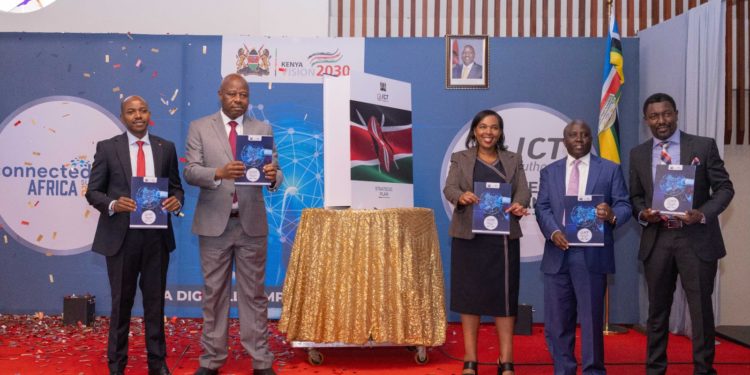Kenya’s ICT Authority has launched a comprehensive four-year Strategic Plan (2024-2027), aiming to revolutionize the country’s digital landscape through substantial infrastructure investments and technological advancements. This ambitious strategy focuses on expanding broadband connectivity, enhancing digital literacy, and improving public e-government services.
At the heart of the plan is the development of an extensive fiber optic network, targeting 100,000 kilometers of coverage nationwide. This infrastructure will underpin the establishment of 25,000 public Wi-Fi hotspots and the creation of 1,450 Digital Village Smart Hubs. These initiatives are designed to ensure that digital access and services reach even the most remote and underserved areas of Kenya.
Dr. Margaret Ndung’u, Cabinet Secretary for Information, Communications, and the Digital Economy, highlighted the significance of the plan in her speech at the launch event. “With this strategic plan, we are building digital bridges that span the width of our great nation, ensuring that no community, no person is left behind in our digital evolution,” she said. She emphasized the plan’s focus on empowering women in rural areas, noting that “our future generation is predominantly in their hands.”
The strategic plan aligns with the National Digital Masterplan 2022-2032 and is intended to facilitate the Ministry’s broader goals. By improving digital infrastructure and accessibility, the strategy seeks to transform public service delivery through e-government services, making essential services more accessible to all citizens.
In addition to domestic initiatives, Kenya is preparing to host the second edition of the Connected Africa Summit. This event aims to harmonize regional and continental ICT policies and will serve as a platform for stakeholders to discuss and address the challenges facing the digital sector. Dr. Ndung’u assured that the Ministry is committed to creating an environment conducive to both national and international investors, stating, “Our role as a government is to be a facilitator, to create opportunities and remove barriers.”
The Connected Africa Summit 2025 is set to play a pivotal role in showcasing and advancing local innovations. ICT and Digital Economy PS Eng. John Tanui expressed the government’s intention for the 2025 Summit to be predominantly led by the private sector. He stressed the importance of using the summit as a platform for sharing experiences on local manufacturing and software development, encouraging further investment in these areas.
Stanley Kamanguya, CEO of the ICT Authority, outlined the plan’s financial aspects, including strategies for revenue generation from existing government ICT infrastructure. “Within this Strategy, we have identified some revenue-raising measures that the Authority can undertake to support the government’s agenda on the digital economy,” Kamanguya said. He emphasized the potential to unlock the value of the National Optic Fibre Backbone Infrastructure (NOFBI) investments by collaborating with the private sector to commercialize these assets.
The strategic plan’s launch was attended by key figures including Broadcasting and Telecommunication PS Prof. Edward Kisiang’ani and ICT Board Chairman Hon. Sylvanus Maritim. The event also saw participation from ICT sector CEOs and partners of the Connected Africa Summit 2024.


















